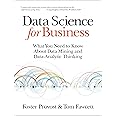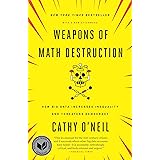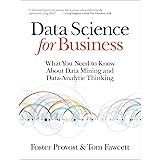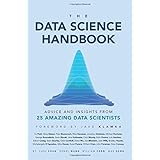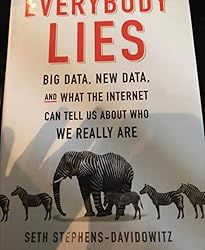
Enjoy fast, free delivery, exclusive deals, and award-winning movies & TV shows with Prime
Try Prime
and start saving today with fast, free delivery
Amazon Prime includes:
Fast, FREE Delivery is available to Prime members. To join, select "Try Amazon Prime and start saving today with Fast, FREE Delivery" below the Add to Cart button.
Amazon Prime members enjoy:- Cardmembers earn 5% Back at Amazon.com with a Prime Credit Card.
- Unlimited Free Two-Day Delivery
- Streaming of thousands of movies and TV shows with limited ads on Prime Video.
- A Kindle book to borrow for free each month - with no due dates
- Listen to over 2 million songs and hundreds of playlists
- Unlimited photo storage with anywhere access
Important: Your credit card will NOT be charged when you start your free trial or if you cancel during the trial period. If you're happy with Amazon Prime, do nothing. At the end of the free trial, your membership will automatically upgrade to a monthly membership.
Buy new:
-46% $15.68$15.68
Ships from: Amazon.com Sold by: Amazon.com
Save with Used - Good
$9.06$9.06
Ships from: Amazon Sold by: FindAnyBook

Download the free Kindle app and start reading Kindle books instantly on your smartphone, tablet, or computer - no Kindle device required.
Read instantly on your browser with Kindle for Web.
Using your mobile phone camera - scan the code below and download the Kindle app.

OK
Image Unavailable
Color:
-

-
-
- To view this video download Flash Player
-

-
 VIDEO
VIDEO -

 Audible sample Sample
Audible sample Sample 


Everybody Lies: Big Data, New Data, and What the Internet Can Tell Us About Who We Really Are Hardcover – Illustrated, May 9, 2017

Explore your book, then jump right back to where you left off with Page Flip.
View high quality images that let you zoom in to take a closer look.
Enjoy features only possible in digital – start reading right away, carry your library with you, adjust the font, create shareable notes and highlights, and more.
Discover additional details about the events, people, and places in your book, with Wikipedia integration.
Purchase options and add-ons
An Economist Best Book of the Year
A PBS NewsHour Book of the Year
An Entrepeneur Top Business Book
An Amazon Best Book of the Year in Business and Leadership
New York Times Bestseller
Foreword by Steven Pinker, author of The Better Angels of our Nature
Blending the informed analysis of The Signal and the Noise with the instructive iconoclasm of Think Like a Freak, a fascinating, illuminating, and witty look at what the vast amounts of information now instantly available to us reveals about ourselves and our world—provided we ask the right questions.
By the end of an average day in the early twenty-first century, human beings searching the internet will amass eight trillion gigabytes of data. This staggering amount of information—unprecedented in history—can tell us a great deal about who we are—the fears, desires, and behaviors that drive us, and the conscious and unconscious decisions we make. From the profound to the mundane, we can gain astonishing knowledge about the human psyche that less than twenty years ago, seemed unfathomable.
Everybody Lies offers fascinating, surprising, and sometimes laugh-out-loud insights into everything from economics to ethics to sports to race to sex, gender and more, all drawn from the world of big data. What percentage of white voters didn’t vote for Barack Obama because he’s black? Does where you go to school effect how successful you are in life? Do parents secretly favor boy children over girls? Do violent films affect the crime rate? Can you beat the stock market? How regularly do we lie about our sex lives and who’s more self-conscious about sex, men or women?
Investigating these questions and a host of others, Seth Stephens-Davidowitz offers revelations that can help us understand ourselves and our lives better. Drawing on studies and experiments on how we really live and think, he demonstrates in fascinating and often funny ways the extent to which all the world is indeed a lab. With conclusions ranging from strange-but-true to thought-provoking to disturbing, he explores the power of this digital truth serum and its deeper potential—revealing biases deeply embedded within us, information we can use to change our culture, and the questions we’re afraid to ask that might be essential to our health—both emotional and physical. All of us are touched by big data everyday, and its influence is multiplying. Everybody Lies challenges us to think differently about how we see it and the world.
- Print length352 pages
- LanguageEnglish
- PublisherDey Street Books
- Publication dateMay 9, 2017
- Dimensions1.3 x 5.7 x 8.3 inches
- ISBN-100062390856
- ISBN-13978-0062390851
Frequently bought together
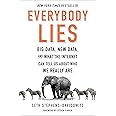
Similar items that may deliver to you quickly
 Allowing us to zoom in on small subsets of people is the third power of Big Data.Highlighted by 2,515 Kindle readers
Allowing us to zoom in on small subsets of people is the third power of Big Data.Highlighted by 2,515 Kindle readers Allowing us to do many causal experiments is the fourth power of Big Data.Highlighted by 2,427 Kindle readers
Allowing us to do many causal experiments is the fourth power of Big Data.Highlighted by 2,427 Kindle readers The power in Google data is that people tell the giant search engine things they might not tell anyone else.Highlighted by 1,792 Kindle readers
The power in Google data is that people tell the giant search engine things they might not tell anyone else.Highlighted by 1,792 Kindle readers
Editorial Reviews
Review
“This book is about a whole new way of studying the mind . . . an unprecedented peek into people’s psyches . . . Time and again my preconceptions about my country and my species were turned upside-down by Stephens-Davidowitz’s discoveries . . . endlessly fascinating.” — Steven Pinker, author of The Better Angels of Our Nature
“Move over Freakonomics. Move over Moneyball. This brilliant book is the best demonstration yet of how big data plus cleverness can illuminate and then move the world. Read it and you’ll see life in a new way.” — Lawrence Summers, President Emeritus and Charles W. Eliot University Professor of Harvard University
“Everybody Lies relies on big data to rip the veneer of what we like to think of as our civilized selves. A book that is fascinating, shocking, sometimes horrifying, but above all, revealing.” — Tim Wu, author of The Attention Merchants
“Brimming with intriguing anecdotes and counterintuitive facts, Stephens-Davidowitz does his level best to help usher in a new age of human understanding, one digital data point at a time.” — Fortune, Best New Business Books
“Freakonomics on steroids―this book shows how big data can give us surprising new answers to important and interesting questions. Seth Stephens-Davidowitz brings data analysis alive in a crisp, witty manner, providing a terrific introduction to how big data is shaping social science.” — Raj Chetty, Professor of Economics at Stanford University
“Everybody Lies is a spirited and enthralling examination of the data of our lives. Drawing on a wide variety of revelatory sources, Seth Stephens-Davidowitz will make you cringe, chuckle, and wince at the people you thought we were.” — Christian Rudder, author of Dataclysm
“A tour de force―a well-written and entertaining journey through big data that, along the way, happens to put forward an important new perspective on human behavior itself. If you want to understand what’s going on in the world, or even with your friends, this is one book you should read cover to cover.” — Peter Orszag, Managing Director, Lazard and former Director of the Office of Management and Budget
“Stephens-Davidowitz, a former data scientist at Google, has spent the last four years poring over Internet search data . . . What he found is that Internet search data might be the Holy Grail when it comes to understanding the true nature of humanity.” — New York Post
“Everybody Lies is an astoundingly clever and mischievous exploration of what big data tells us about everyday life. Seth Stephens-Davidowitz is as good a data storyteller as I have ever met.” — Steven Levitt, co-author, Freakonomics
“A whirlwind tour of the modern human psyche using search data as its guide. . . . The empirical findings in Everybody Lies are so intriguing that the book would be a page-turner even if it were structured as a mere laundry list.” — The Economist
“Pivotal . . . A book for those who are intensely curious about human nature, informational analysis, and amusing anecdotes to the tune of Steven Levitt and Stephen Dubner’s Freakanomics.” — Library Journal
From the Back Cover
How much sex are people really having?
How many Americans are actually racist?
Is America experiencing a hidden back-alley abortion crisis?
Can you game the stock market?
Does violent entertainment increase the rate of violent crime?
Do parents treat sons differently from daughters?
How many people actually read the books they buy?
In this groundbreaking work, Seth Stephens-Davidowitz, a Harvard-trained economist, former Google data scientist, and New York Times writer, argues that much of what we thought about people has been dead wrong. The reason? People lie, to friends, lovers, doctors, surveys—and themselves.
However, we no longer need to rely on what people tell us. New data from the internet—the traces of information that billions of people leave on Google, social media, dating, and even pornography sites—finally reveals the truth. By analyzing this digital goldmine, we can now learn what people really think, what they really want, and what they really do. Sometimes the new data will make you laugh out loud. Sometimes the new data will shock you. Sometimes the new data will deeply disturb you. But, always, this new data will make you think.
Everybody Lies combines the informed analysis of Nate Silver’s The Signal and the Noise, the storytelling of Malcolm Gladwell’s Outliers, and the wit and fun of Steven Levitt and Stephen Dubner’s Freakonomics in a book that will change the way you view the world. There is almost no limit to what can be learned about human nature from Big Data—provided, that is, you ask the right questions.
About the Author
Seth Stephens-Davidowitz is a contributing op-ed writer for the New York Times, a lecturer at The Wharton School, and a former Google data scientist. He received a BA from Stanford and a PhD from Harvard. His research has appeared in the Journal of Public Economics and other prestigious publications. He lives in New York City.
Product details
- Publisher : Dey Street Books; Illustrated edition (May 9, 2017)
- Language : English
- Hardcover : 352 pages
- ISBN-10 : 0062390856
- ISBN-13 : 978-0062390851
- Item Weight : 2.31 pounds
- Dimensions : 1.3 x 5.7 x 8.3 inches
- Best Sellers Rank: #97,330 in Books (See Top 100 in Books)
- #32 in Business Statistics
- #37 in Data Mining (Books)
- #77 in Statistics (Books)
- Customer Reviews:
About the author

Seth is a data scientist, economist, and author. He has worked as a data scientist at Google, a contributing op-ed writer for the New York Times, and a visiting lecturer at The Wharton School. He is the author of 3 books, including Everybody Lies, which was a New York Times bestseller and an Economist Book of the Year. He has a BA in philosophy from Stanford and a PhD in economics from Harvard. He lives in Brooklyn and is a passionate fan of the Mets, Knicks, Jets, and Leonard Cohen.
Customer reviews
Customer Reviews, including Product Star Ratings help customers to learn more about the product and decide whether it is the right product for them.
To calculate the overall star rating and percentage breakdown by star, we don’t use a simple average. Instead, our system considers things like how recent a review is and if the reviewer bought the item on Amazon. It also analyzed reviews to verify trustworthiness.
Learn more how customers reviews work on AmazonReviews with images
-
Top reviews
Top reviews from the United States
There was a problem filtering reviews right now. Please try again later.
Some of my favorite parts of the book were the various studies the author conducted using Google search data, particularly regarding sexual orientation, voting behavior, and racial biases. That said, I also really enjoyed earlier parts of his book that had nothing to do with Google and talked about big data generally, particularly when he talked about studies involving horse racing and the socioeconomic backgrounds of NBA players. There was also a section of the book that talked about students who did and didn’t attend highly competitive public schools in New York and measured the impact on their future, which I thought was very interesting. Generally, as interesting as the individual studies were, I think the underlying implications behind them were even more compelling, whether in the business, political, or academic realms.
If the book has flaws, I would say that the author could be overtly preachy at times, to a degree to which I could see skeptics using his clearly stated opinions as reasons to wrongfully discard his analysis. For example, his analysis on why people voted for Donald Trump is simultaneously interesting and disturbing when he ties it to underlying feelings regarding race. But the author makes so many off-handed comments about Trump throughout the book that I could see anyone “on the fence” being completely turned off regardless of what the data says, for right or wrong. Likewise, I think his conclusions about Big Data are a bit bombastic. The key value in this book are the insights about Google data, however the author tries positioning his work as being on the cutting edge of a big data “revolution” that in reality is almost a decade old.
Still, the book was fantastic overall and certainly gives you a lot to think about. I really do think the implications of using Google data are pretty incredible and the author does a great job presenting his findings and its potential uses and/or pitfalls. I would highly recommend this book to anyone mildly curious about big data or human psychology.
What has allowed us to access this pool of unguarded opinions and truckloads of data concerning human behavior is the Internet and the tools of "big" data. As the author puts it, this data is not just "big" but also "new", which means that the kind of data we can access is also quite different from what we are used to; in his words, we live in a world where every sneeze, cough, internet purchase, political opinion, and evening run can be considered "data". This makes it possible to test hypotheses that we could not have tested before. For instance, the author gives the example of testing Freud's Oedipus Complex through accessing pornographic data which indicates a measurable interest in incest. Generally speaking there is quite an emphasis on exploring human sexuality in the book, partly because sexuality is one of those aspects of our life that we wish to hide the most and are also pruriently interested in, and partly because investigating this data through Google searches and pornographic sites reveals some rather bizarre sexual preference that are also sometimes specific to one country or another. This is a somewhat fun use of data mining.
Data exploration can both reveal the obvious as well as throw up unexpected observations. A more serious use of data tools concerns political opinions. Based on Google searches in particular states, the author shows how racism (as indicated by racist Google searches) was a primary indicator of which states voted for Obama in the 2008 election and Trump in the 2016 election. That's possibly an obvious conclusion, at least in retrospect. A more counterintuitive conclusion is that the racism divide does not seem to map neatly on the urban-rural divide or the North-South divide, but rather on the East-West divide; people seem to be searching much more for explicitly racist things in the East compared to the West. There is also an interesting survey of gay people in more and less tolerant states which concludes that you are as likely to find gay people in both parts of the country. Another interesting section of the book talked about how calls for peace by politicians after terrorist attacks actually lead to more rather than less xenophobic Google searches; this is accompanied by a section that hints at how the trends can be potentially reversed if different words are used in political speeches. There is also an interesting discussion of how the belief that newspaper political leanings drive customer political preferences gets it exactly backward; the data shows that customer political preferences shape what newspapers print, so effectively they are doing nothing different from any other customer-focused, profit making organization.
The primary tool for doing all this data analysis is correlation or regression analysis, where you look at online searches and try to find correlations between certain terms and factors like geographic location, gender, ethnicity. One hopes that one has separated the most important correlated variable and has eliminated other potentially important ones.
There are tons of other amusing and informative studies - sometimes the author's own but more often other people's - that reveal human desires and behavior across a wide swathe of fields, including politics, dating, sports, education, shopping and sexuality. There's plenty of potentially useful material in these studies. For instance, some of the data that indicates gaps in educational or social attainment in different parts of the country are immediately actionable in principle. Google searches have also been used to keep track of flu and other disease epidemics. Sometimes finding correlations is financially lucrative; there is a story about how a horse expert found that success in horse races seems to correlate with one factor more than any other: the size of the left ventricle. Another study isolated the impact of the early growing season on the quality of wines. There is no doubt that financial firms, supermarkets, newspapers, hospitals and online purveyors of everything from pornography to peanuts are going to keep a close eye on this data to maximize their reach and profits.
Generally speaking I enjoyed "Everybody Lies"; for the scope of the material, the easy-going style and some of the counterintuitive observations it reveals. My main reservation about the book is that I think the author overstates his case and sometimes sounds a little too breathless about the great changes these tools are going to bring. More than once he uses the term "revolutionary" in describing these data tools, but I am much more suspicious of their ultimate utility. Firstly, data does not equal knowledge; rather, it is the raw material for knowledge. As the author himself acknowledges, understanding correlation is not the same as understanding causation, and it's in very few cases that a true causal relationship between people's Google searches and their true nature can be established. Part of the reason I think this way is because I don't believe that a person's Google search is as reflective of their innermost desires as the book seems to think, so what a person truly believes may go way beyond their online behavior. Consider the studies revealing people's sexual preferences for instance; how many of them point to trivial idiosyncrasies and how many are indicative of some deeper truth about human brains? The tools alone cannot draw this distinction. At the end of the day you could thus end up with a lot of data (including a lot of noise), but teasing apart the useful data points from the red herrings is a completely different matter. In this sense, looking at Google searches and other information can be a reductionist and simplistic approach.
Secondly, it's usually quite hard to control for all possible variables that may reflect a Google search; for instance in concluding that racism contributes the most to a particular political behavior, it's very hard to tease out all other factors that also may do so, especially when you are talking about a heterogeneous collection of human beings. How can you know that you have corrected for every possible factor? Thirdly and finally, the "science" part of "data science" still lacks rigor in my opinion. For instance, a lot of the conclusions the book talks about are based on single studies which don't seem to be repeated. In some cases the sample sizes are large, but in other cases they are small. Plus, people's opinions can change over time, so it's important to pick the right time window in which to do the study. All this points to great responsibility on the part of data scientists to make sure that their results are rigorous and not too simplistic, before they are taken up by both politicians and the general public as blunt instruments to change social policies. This responsibility increases especially as these approaches become more widespread and cheaper to use, especially in the hands of non-specialists. When you are in possession of a hammer, everything starts looking like a nail.
Considering all these caveats, I thus find tools like those described in this volume to be the starting points for understanding human behavior, rather than direct determinants of human behavior. The tools themselves can tell you what they can be used for, not necessarily what problems would benefit the most from their application. The many interesting studies in this book certainly answer the "what" quite well, but most of them are still quite far from answering the "how" and especially the "why". They point out the path to the door, but don't necessarily tell us which door to open. And they can be especially impoverished in illuminating what lies beyond; for that only a true understanding of the human mind will pave the way.
Top reviews from other countries
Put your phone away and read, FGS.
It's not a technical book, but it gives you perspectives about some real implementations.
This book is accessible by everyone, and it's never boring.
It's for everyone interested in Data Science and it's real application on detecting patterns in social behaviors.
Identifying an audience and understanding its motivation is critical to planning and engagement. It informs strategy, media and content.
But what do you do if people don’t tell the truth? They typically don’t. People tell pollsters and market researchers what they think they want to hear.
I’ve started dry January this month and signed up to the Try Dry app from Alcohol Change UK. It coaches you to reduce your alcohol consumption with daily nudges and rewards.
The app asked me to submit data about my drinking habits. When I entered my data, I reduced my actual alcohol consumption by approximately a quarter.
Even when asked for data anonymously in the privacy of our own home we modify our response to present the best version of ourselves, or at least the version we think that others expect.
This effect is called response bias. It goes someway to explaining why pollsters call elections wrong, notably the Brexit vote in the UK in 2016, and President Donald Trump’s US election success late the same year.
It’s the basis of Seth Stephens-Davidowitz’s book Everybody Lies: Big Data, New Data, and What the Internet Can Tell Us About Who We Really Are. If you’re interested in the growing use of data in business, science, or politics you should read this book.
Stephens-Davidowitz suggests that Google provides a means to obtain an accurate insight into consumer behaviour.
People share their deepest fears and secrets with the Google search box. This behavioural trait combined with the sheer volume of data, so called big data, creates a useful source of insight into the human condition. It’s a growing area of psychology and social science.
The Google dataset is accessible to marketing and PR practitioners via autocomplete data using tools such as AnswerThePublic, and search volumes using the Google Trends and Google Ads Keyword Planner.
It has led to an emerging marketing and PR discipline called search listening. Indeed, it’s the subject of a book by Sophie Coley called Consumer Insight in the Age of Google and the basis of her Search Listening consulting and training business.
Stephens-Davidowitz uses Google data to explore attitudes to mental health, parenting, race, reproduction, sex and more. The book is written for an American audience but it’s application and insight are global.
The book isn’t limited to the Google dataset. Stephens-Davidowitz describes how insights can be discovered in any large data set. He explores datasets related to the economy, population, educational attainment, sports and more.
In the final chapter Stephens-Davidowitz shares a study of Amazon Kindle comments that provide insight into the number of readers that complete non-fiction books. You’ll have to read the book for yourself to discover the answer.





